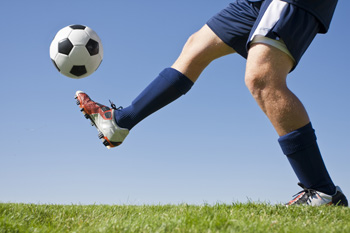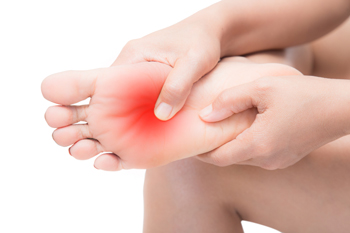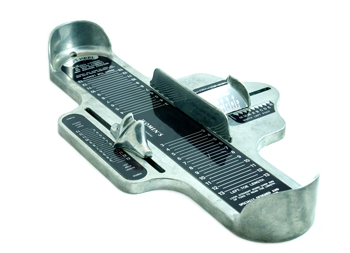Items filtered by date: June 2019
Are Plantar Warts Contagious?
 A plantar wart is defined as a wart that forms on the bottom of the foot. They can develop on the heels or on the balls of the feet, and can cause considerable pain and discomfort. Many of these types of warts have tiny black dots in the center, and can appear disfigured. As this type of wart develops, it grows into the sole of the foot as a result of standing or walking for the majority of the day. Plantar warts are considered to be contagious, and the virus that causes this condition thrives in moist and warm areas. Research has indicated that it is beneficial to wear appropriate shoes while in public pools, locker rooms, and surrounding areas. There are several treatment options that are available which can provide relief. If you feel you have developed a plantar wart, please consult with a podiatrist who can guide you towards proper treatment.
A plantar wart is defined as a wart that forms on the bottom of the foot. They can develop on the heels or on the balls of the feet, and can cause considerable pain and discomfort. Many of these types of warts have tiny black dots in the center, and can appear disfigured. As this type of wart develops, it grows into the sole of the foot as a result of standing or walking for the majority of the day. Plantar warts are considered to be contagious, and the virus that causes this condition thrives in moist and warm areas. Research has indicated that it is beneficial to wear appropriate shoes while in public pools, locker rooms, and surrounding areas. There are several treatment options that are available which can provide relief. If you feel you have developed a plantar wart, please consult with a podiatrist who can guide you towards proper treatment.
Plantar warts can be very uncomfortable. If you need your feet checked, contact one of our podiatrists from Carolina Foot & Ankle. Our doctors will assist you with all of your foot and ankle needs.
About Plantar Warts
Plantar warts are the result of HPV, or human papillomavirus, getting into open wounds on the feet. They are mostly found on the heels or balls of the feet.
While plantar warts are generally harmless, those experiencing excessive pain or those suffering from diabetes or a compromised immune system require immediate medical care. Plantar warts are easily diagnosed, usually through scraping off a bit of rough skin or by getting a biopsy.
Symptoms
- Lesions on the bottom of your feet, usually rough and grainy
- Hard or thick callused spots
- Wart seeds, which are small clotted blood vessels that look like little black spots
- Pain, discomfort, or tenderness of your feet when walking or standing
Treatment
- Freezing
- Electric tool removal
- Laser Treatment
- Topical Creams (prescription only)
- Over-the-counter medications
To help prevent developing plantar warts, avoid walking barefoot over abrasive surfaces that can cause cuts or wounds for HPV to get into. Avoiding direct contact with other warts, as well as not picking or rubbing existing warts, can help prevent the further spread of plantar warts. However, if you think you have developed plantar warts, speak to your podiatrist. He or she can diagnose the warts on your feet and recommend the appropriate treatment options.
If you have any questions please feel free to contact one of our offices located in Huntersville Office | 16419 Northcross Dr Suite A, Huntersville, NC 28078; Mooresvillle Office | 206 Joe Knox Avenue Suite D, Mooresville, NC 28117; and Mountain Island | 10310 Couloak Drive Suite 200, Charlotte, NC 28216 . We offer the newest diagnostic and treatment technologies for all your foot and ankle needs.
Which Athletes Hurt Their Feet the Most
 Athletes are known to have many foot and ankle complications. Some issues tend to affect the athletes of specific sports more than others. For example, “turf toe” is common among those who participate in football, soccer, basketball, wrestling, gymnastics, and dance. Turf toe is the spraining of the big toe joint. Another usual injury among athletes is a stress fracture. Those who run and jump on hard surfaces, such as runners, basketball players, and dancers, commonly experience fractures. Additionally, Achilles tendonitis, which is the inflammation of the back of your ankle, is seen among basketball and tennis players. Finally, a pinched nerve condition known as tarsal tunnel syndrome is seen among various types of athletes. Considering the extra stress athletes put on their bodies, it is no surprise that they are prone to foot and ankle injuries. These people in particular should look out for complications so they can continue performing in their respective sport effectively. If you believe you may have a foot or ankle injury due to a sport, you should contact a podiatrist.
Athletes are known to have many foot and ankle complications. Some issues tend to affect the athletes of specific sports more than others. For example, “turf toe” is common among those who participate in football, soccer, basketball, wrestling, gymnastics, and dance. Turf toe is the spraining of the big toe joint. Another usual injury among athletes is a stress fracture. Those who run and jump on hard surfaces, such as runners, basketball players, and dancers, commonly experience fractures. Additionally, Achilles tendonitis, which is the inflammation of the back of your ankle, is seen among basketball and tennis players. Finally, a pinched nerve condition known as tarsal tunnel syndrome is seen among various types of athletes. Considering the extra stress athletes put on their bodies, it is no surprise that they are prone to foot and ankle injuries. These people in particular should look out for complications so they can continue performing in their respective sport effectively. If you believe you may have a foot or ankle injury due to a sport, you should contact a podiatrist.
Sports related foot and ankle injuries require proper treatment before players can go back to their regular routines. For more information, contact one of our podiatrists of Carolina Foot & Ankle. Our doctors can provide the care you need to keep you pain-free and on your feet.
Sports Related Foot and Ankle Injuries
Foot and ankle injuries are a common occurrence when it comes to athletes of any sport. While many athletes dismiss the initial aches and pains, the truth is that ignoring potential foot and ankle injuries can lead to serious problems. As athletes continue to place pressure and strain the area further, a mild injury can turn into something as serious as a rupture and may lead to a permanent disability. There are many factors that contribute to sports related foot and ankle injuries, which include failure to warm up properly, not providing support or wearing bad footwear. Common injuries and conditions athletes face, including:
- Plantar Fasciitis
- Plantar Fasciosis
- Achilles Tendinitis
- Achilles Tendon Rupture
- Ankle Sprains
Sports related injuries are commonly treated using the RICE method. This includes rest, applying ice to the injured area, compression and elevating the ankle. More serious sprains and injuries may require surgery, which could include arthroscopic and reconstructive surgery. Rehabilitation and therapy may also be required in order to get any recovering athlete to become fully functional again. Any unusual aches and pains an athlete sustains must be evaluated by a licensed, reputable medical professional.
If you have any questions please feel free to contact one of our offices located in Huntersville Office | 16419 Northcross Dr Suite A, Huntersville, NC 28078; Mooresvillle Office | 206 Joe Knox Avenue Suite D, Mooresville, NC 28117; and Mountain Island | 10310 Couloak Drive Suite 200, Charlotte, NC 28216 . We offer the newest diagnostic and treatment technologies for all your foot and ankle needs.
The Feet and Rheumatoid Arthritis
 Most people with rheumatoid arthritis experience pain in their feet at some point during their time with the ailment. Understanding the disease and the effects it could have on the feet may help you recognize the problem early and begin treatment. Rheumatoid arthritis is a disease in which the body attacks its own joints. This disease is unique in that many joints may be impacted at the same time. People with the disease may notice the development of bunions, hammertoes, and fallen arches. Additional foot complications affiliated with rheumatoid arthritis include heel pain, pinched nerves, nodules and rashes. The condition is painful and incurable. However, early treatment can help people with the disease control the discomfort and maintain their livelihoods. If you are experiencing any type of foot pain, it is suggested that you consult with a podiatrist.
Most people with rheumatoid arthritis experience pain in their feet at some point during their time with the ailment. Understanding the disease and the effects it could have on the feet may help you recognize the problem early and begin treatment. Rheumatoid arthritis is a disease in which the body attacks its own joints. This disease is unique in that many joints may be impacted at the same time. People with the disease may notice the development of bunions, hammertoes, and fallen arches. Additional foot complications affiliated with rheumatoid arthritis include heel pain, pinched nerves, nodules and rashes. The condition is painful and incurable. However, early treatment can help people with the disease control the discomfort and maintain their livelihoods. If you are experiencing any type of foot pain, it is suggested that you consult with a podiatrist.
Because RA affects more than just your joints, including the joints in your feet and ankles, it is important to seek early diagnosis from your podiatrist if you feel like the pain in your feet might be caused by RA. For more information, contact one of our podiatrists of Carolina Foot & Ankle. Our doctors will assist you with all of your podiatric concerns.
What Is Rheumatoid Arthritis?
Rheumatoid Arthritis (RA) is an autoimmune disorder in which the body’s own immune system attacks the membranes surrounding the joints. Inflammation of the lining and eventually the destruction of the joint’s cartilage and bone occur, causing severe pain and immobility.
Rheumatoid Arthritis of the Feet
Although RA usually attacks multiple bones and joints throughout the entire body, almost 90 percent of cases result in pain in the foot or ankle area.
Symptoms
- Swelling and pain in the feet
- Stiffness in the feet
- Pain on the ball or sole of feet
- Joint shift and deformation
Diagnosis
Quick diagnosis of RA in the feet is important so that the podiatrist can treat the area effectively. Your doctor will ask you about your medical history, occupation, and lifestyle to determine the origin of the condition. Rheumatoid Factor tests help to determine if someone is affected by the disease.
If you have any questions please feel free to contact one of our offices located in Huntersville Office | 16419 Northcross Dr Suite A, Huntersville, NC 28078; Mooresvillle Office | 206 Joe Knox Avenue Suite D, Mooresville, NC 28117; and Mountain Island | 10310 Couloak Drive Suite 200, Charlotte, NC 28216 . We offer the newest diagnostic and treatment technologies for all your foot and ankle needs.
Heel Pain Can Be Treated!
Methods to Measure Your Feet
 Research has indicated that many people have admitted their shoes, which are frequently worn, do not fit correctly. This can produce unwanted foot conditions that include bunions, hammertoes, and general foot pain. It is important to determine the correct shoe size in order to select shoes that fit properly. This can be accomplished by having them professionally measured using a Brannock device, or measuring the feet yourself by tracing them on a piece of paper. This is done by placing your bare foot on a sheet of paper while sitting down, followed by tracing the length and width of your foot. After using a ruler to determine how long and wide your foot is, it can be compared to a chart that is comprised of different shoe sizes. If you would like additional information about how to properly measure your feet, it is suggested to counsel with a podiatrist.
Research has indicated that many people have admitted their shoes, which are frequently worn, do not fit correctly. This can produce unwanted foot conditions that include bunions, hammertoes, and general foot pain. It is important to determine the correct shoe size in order to select shoes that fit properly. This can be accomplished by having them professionally measured using a Brannock device, or measuring the feet yourself by tracing them on a piece of paper. This is done by placing your bare foot on a sheet of paper while sitting down, followed by tracing the length and width of your foot. After using a ruler to determine how long and wide your foot is, it can be compared to a chart that is comprised of different shoe sizes. If you would like additional information about how to properly measure your feet, it is suggested to counsel with a podiatrist.
Getting the right shoe size is an important part of proper foot health. Seek the assistance of one of our podiatrists from Carolina Foot & Ankle. Our doctors will provide the care you need to keep you pain-free and on your feet.
Getting the Right Shoe Size
There are many people who wear shoes that are the incorrect size, negatively affecting their feet and posture. Selecting the right shoes is not a difficult process, so long as you keep several things in mind when it comes to choosing the right pair.
- When visiting the shoe store, use the tools available to measure your foot.
- Be sure there is ‘wiggle room’. There should be about an inch between your toes and the tip of your shoes.
- Do not always assume you are the same size, as manufacturers run differently.
- Purchase shoes later in the day, as your feet swell as the day progresses.
- If a shoe is not comfortable, it is not suitable. Most shoes can’t be ‘broken in’, and comfort should be the ultimate goal when it comes to choosing the right pair of shoes
As our feet hold our body weight and keep us moving, it is important to treat them right. Picking the right pair of shoes can provide your feet comfort and mobility without pain.
If you have any questions, please feel free to contact one of our offices located in Huntersville Office | 16419 Northcross Dr Suite A, Huntersville, NC 28078; Mooresvillle Office | 206 Joe Knox Avenue Suite D, Mooresville, NC 28117; and Mountain Island | 10310 Couloak Drive Suite 200, Charlotte, NC 28216 . We offer the newest diagnostic and treatment technologies for all your foot care needs.

